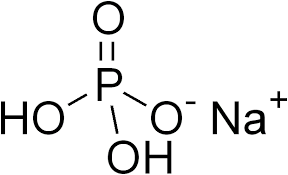Monosodium Phosphate

Product Description
Monosodium phosphate, also known as sodium dihydrogen phosphate, is a chemical compound with various industrial, commercial, and food-related applications.
Product:
Monosodium Phosphate
CAS:
7558-80-7
Synonym:
Sodium dihydrogen phosphate; Sodium phosphate monobasic
Structure:

Typical Characteristics
Appearance
White crystalline powder
Density
2.36 g/cm3
Melting point
200 °C (decomposes)
Molecular Weight
119.98
Odor
Odorless
Purity
≥99%
Uses, Applications & Markets
Key applications
Markets
get a quote
We Offer Monosodium Phosphate
in various grades
A few of the grades available are listed below:



Monosodium Phosphate used in many
industry applications
Monosodium phosphate, also known as sodium dihydrogen phosphate, is a chemical compound with various industrial, commercial, and food-related applications. Here are some of its uses:
- Food Additive: Monosodium phosphate is commonly used as a food additive in the food processing industry. It serves as an emulsifier, pH regulator, and buffering agent in a variety of food products such as processed meats, cheeses, beverages, baked goods, and canned goods. It helps improve texture, prevent crystallization, and adjust acidity levels in food formulations.
- Emulsifier: Monosodium phosphate is used as an emulsifying agent in food products to help stabilize oil-in-water emulsions and prevent separation. It can enhance the texture, appearance, and shelf stability of dressings, sauces, spreads, and processed foods by promoting uniform dispersion of ingredients.
- pH Buffer: Monosodium phosphate is used as a pH buffer or pH regulator in various food and beverage applications. It helps maintain the desired pH level and acidity in food products, preventing changes in flavor, color, and texture during processing and storage. Monosodium phosphate is often used in combination with other phosphate salts to create specific pH conditions.
- Water Treatment: Monosodium phosphate is used in water treatment applications as a corrosion inhibitor, scale inhibitor, and pH adjuster. It can help control the pH of water in industrial processes, boilers, cooling towers, and swimming pools, preventing corrosion of metal surfaces and scaling caused by mineral deposits.
- Pharmaceuticals: Monosodium phosphate is used in the pharmaceutical industry as an excipient or buffering agent in the formulation of oral medications, tablets, and solutions. It helps stabilize the pH of pharmaceutical formulations, improve solubility of active ingredients, and enhance the effectiveness and stability of drug products.
- Chemical Synthesis: Monosodium phosphate is used as a reagent or intermediate in various chemical synthesis reactions. It may be employed in the production of specialty chemicals, detergents, fertilizers, and flame retardants, as well as in laboratory research and analytical chemistry applications.
- Animal Feed: Monosodium phosphate is used as a dietary supplement in animal feed formulations for livestock, poultry, and pets. It provides essential phosphorus and sodium nutrients necessary for growth, bone development, and overall health in animals. Monosodium phosphate supplementation can help balance the mineral content of feed rations and improve animal performance.
- Electroplating: Monosodium phosphate is used in electroplating baths as an additive to improve the performance and efficiency of metal plating processes. It can help control pH, reduce metal contamination, and enhance adhesion and deposition of metal coatings on substrates during electroplating operations.
- Flame Retardants: Monosodium phosphate is sometimes used as a component in flame retardant formulations for textiles, plastics, and building materials. It can help reduce the flammability and improve the fire resistance of materials by releasing water vapor and forming a protective char layer when exposed to heat or flames.
- Industrial Cleaning: Monosodium phosphate is used in industrial cleaning products such as detergents, degreasers, and metal cleaners. It acts as a chelating agent, sequestrant, and pH adjuster, helping to remove mineral deposits, rust stains, and grease from surfaces while preventing scale formation and corrosion.